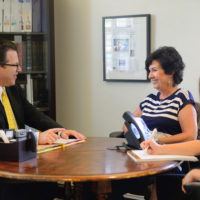Hiring a Home Health Aide: The perspective of an Elder Law Attorney
Home health aides provide caregiving services to help keep people in their own homes or to provide attendant care services in a facility. Home health aides and certified nursing assistants are often the front line in long-term care and yet home health aides are paid relatively little money for doing highly personal, tough work. People often complain about the cost but few of my clients would want to do the tasks these caregivers do for $12-$25/hour. Still, even at those rates, the cost adds up and can seriously impact savings or wipe people out.
There are three primary venues for securing home health aides. From the lowest hourly rate to the highest, they are: (1) finding someone by word-of-mouth; (2) going through a “registry” or (3) going through an “agency.”
Hourly Rates
Hourly rates are not the only cost that must be taken into consideration when hiring a home health aide. There are insurance, tax and other liability issues, safety and reliability that should be considered.
Word of Mouth
Many of my clients come to me already having hired a caregiver based on a referral from someone they know. A neighbor, friend or relative might have worked with this caregiver in the past and given his or her name to my client. These workers can be very reliable because they may have already been vetted by someone you trust. Because they do not come through a registry or agency, all the money you pay the caregiver goes to the caregiver and you have cut out the middleman. This can be a cost-effective solution if it were not for certain hidden costs. For one, if the independent caregiver gets sick, moves away or just does not show up for work one day, it may be difficult or impossible to arrange for a quick replacement. Some people cannot risk even a day without care. Good home health companies would be ready with a quick replacement right away. Independent caregivers are generally not insured for malpractice. If something goes wrong, there is usually no recourse. Independent caregivers are generally not insured for risk should they become injured on the job; that could be a liability of yours as the employer and/or homeowner. You could do your own criminal background check on a caregiver but I find that few people actually take this step. Some independent caregivers are independent because agencies and registries will no longer hire them due to past violations of trust. Another “hidden” cost to the independent caregiver is that you are the employer and this means that you must deal with withholding taxes.
Registry
A home health registry is like an employment agency for home health aides, a matchmaker service which places home health aides with people who need them. The caregivers are not employees of the registry but instead act as “independent contractors.” The employer is typically the person receiving the care or some family member or fiduciary acting on behalf of the person receiving the care. A good registry attempts to make the best match based on personality, health and other factors. Because a good registry will have many home health aides to call upon, the registry can be effective in quickly getting another person to the client if the prior aide is not working out. Registries typically perform background checks, provide some training and most require the caregiver to carry a minimum amount of malpractice insurance. Still, the caregiver is not an “employee” of the registry and so the responsibility and liability of being an employer still rests with the person receiving the care or that person’s agent. Registries will pay a percentage of the fee they collect to the caregiver but the registries do not withhold taxes. Also, since the registries do not provide workers compensation insurance, bonding or full liability insurance, the client takes on that risk and the financial jeopardy. Because the registry has lower costs and takes less liability and responsibility, not being the employer, registries can charge less than agencies and therefore provide a lower hourly rate.
Agencies
Agencies have a true employer-employee relationship with their caregivers. The agency does all that a registry does including training, background checks and malpractice insurance but also takes on all the responsibility of an employer. The agency deals with all withholding and tax matters, pays for a bond, workers compensation insurance and sometimes other employee benefits. The cost is higher with an agency because the agency is taking on these other costs and responsibilities.
I have clients who have secured aides using all three of the above venues. Each has pros and cons. Like all businesses, there are good and bad. Talk to your advisors in the elder care world before hiring a caregiver and gather the best information before making a decision. What is right for one family may not be right for your family. If you are using a registry or agency, ask the company about what it provides and does not provide as there are differences. Talk to us at Solkoff Legal, P.A., for a referral.











